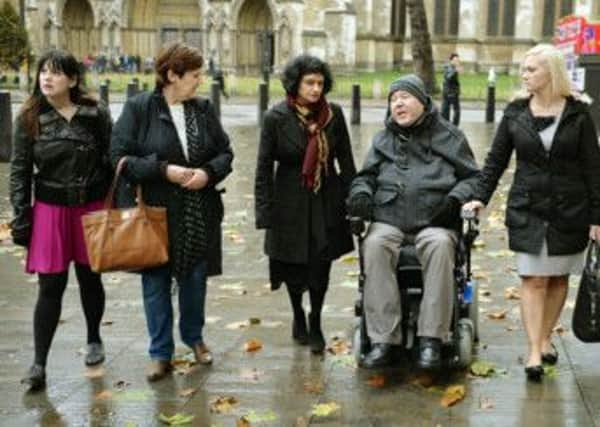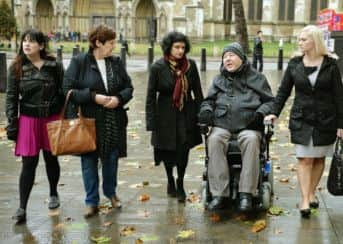They treat pets better says man in right to die battle


Paul Lamb, 58, of Bramley, Leeds, was left paralysed after a 1990 road accident and his joint legal bid, with Wiltshire widow Jane Nicklinson, for a change in the law to assisted dying runs into a second day before nine Supreme Court justices today.
Speaking ahead of the start of yesterday’s proceedings in London, Mr Lamb said: “A change in the law would mean more to me than a million dollars.
Advertisement
Hide AdAdvertisement
Hide Ad“You would not do this with pets. Pets have got the law in their favour.”


Mr Lamb, a father-of-two, and Mrs Nicklinson, 58, of Melksham, Wiltshire, whose late husband Tony had locked-in syndrome, want the UK’s highest court to rule that disabled people should have the right to be helped to die with dignity.
The hearing is due to run for four days and the justices are expected to announce their ruling in the new year.
A Supreme Court spokesman said justices were being asked to decide whether a prohibition on assisted suicide – outlined in the 1961 Suicide Act – was compatible with the right to respect for private and family life enshrined in the European Convention on Human Rights.
Advertisement
Hide AdAdvertisement
Hide AdMr Lamb and Mrs Nicklinson argue the law should include a “defence of necessity”. They say doctors should be allowed to assist suicide when people have a “voluntary, clear, settled and informed” wish to end their life, but cannot do so without medical assistance.
Paul Bowen QC, for Mr Lamb and Mrs Nicklinson, told the court the current position had “extraordinary and cruel consequences” for some disabled people. Mr Bowen said it meant they were unable to end their “unbearable suffering” with dignity, leaving them with the option of a “less dignified” death which might put others at risk of prosecution.
Mr Lamb wants a doctor to help him die in a dignified way because he is immobile except for limited movement in his right hand and has been in significant pain since his accident 23 years ago.
Mrs Nicklinson has said it is important for her to finish the legal battle started by her late husband who died in August 2012, aged 58, after losing a High Court battle to end his life with a doctor’s help.
Advertisement
Hide AdAdvertisement
Hide AdYesterday, she said she was hopeful of success and the campaigners had done all they could.
Justices are also analysing guidance from the Director of Public Prosecutions (DPP) which was issued following the legal battle by Bradford MS sufferer Debbie Purdy, who in July 2009 obtained a House of Lords ruling ordering the DPP to formulate a policy setting out the factors to be considered when deciding whether to prosecute for assisting a suicide.
That issue has been raised by a 49-year-old disabled man known only as Martin who argues the “policy statement” is an unlawful interference with the right to respect for private and family life.
This latest legal action brought by Mr Lamb and Mrs Nicklinson follows an earlier defeat in the High Court and a failure to have the ruling overturned in the Court of Appeal in July. After the appeal hearing, Mr Lamb said: “No retreat, no surrender, is my motto with all of this.”
Advertisement
Hide AdAdvertisement
Hide AdIn the ruling, the then Lord Chief Justice, Lord Judge, said the law relating to assisting suicide could not be changed by judicial decision.
It was submitted on Mr Lamb’s behalf that “the time has now come when the common law should provide a defence to murder where that takes the form of euthanasia”, at least in the circumstances he now faces and Mr Nicklinson had faced.